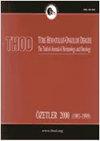胶质母细胞瘤治疗和预后的预后价值:一项回顾性队列研究
IF 0.3
4区 医学
Q4 ONCOLOGY
引用次数: 0
摘要
2021年世界卫生组织(WHO)对中枢神经系统(CNS)肿瘤的分类导致了肿瘤分类学的重大变化。最重要的变化之一是异柠檬酸脱氢酶(IDH)突变形式的多形性胶质母细胞瘤(GBM)已被分化为单独的实体,不再允许将其归类为未另行指定(NOS)。因此,该实体仅包括最具侵袭性的成人型肿瘤,既定的预后因素不再适用。胶质母细胞瘤(GBM) idh野生型CNS WHO 4级典型表现为坏死和/或微血管增生和分子改变。在此,我们的目的是对胶质母细胞瘤病例进行分类,建立患者的生存模式,基于年龄、性别、肿块数量、肿瘤位置、功能定位、移位的存在、水肿和坏死的体积、手术程度、放化疗方案和异柠檬酸脱氢酶(IDH)的存在,回顾性地确定影响总生存的因素。1996年至2019年期间,共有433名20岁原发性GBM患者在同一家机构接受了治疗。中位生存期为9±0.62 [95% CI 7.78 ~ 10.21]个月,诊断后1年生存率为39.4%,2年生存率为17%,3年生存率为5%。统计学上,年龄、肿瘤位置、水肿和坏死被认为是术前预后的独立预测因素,诊断时年龄较小、左颞部和右枕部位置、肿瘤最大切除和替莫唑胺辅助化疗是预后的有利因素。关键词:胶质母细胞瘤,总生存率,预后,手术本文章由计算机程序翻译,如有差异,请以英文原文为准。
The Prognostic Value of the Treatment and Outcome in Patients with Glioblastoma: A Retrospective Cohort Study
The classification of central nervous system (CNS) tumors by the 2021 World Health Organization (WHO) has led to significant changes in tumor taxonomy. One of the most significant changes is that isocitrate dehydrogenase (IDH) mutant forms of glioblastoma multiforme (GBM) have been differentiated into separate entities, no longer allowing entries to be classified as not otherwise specified (NOS). As a result, this entity only comprises the most aggressive adult-type tumors and established prognostic factors no longer apply. Glioblastoma (GBM) IDH-wildtype CNS WHO grade 4 typically presents necrosis and/or microvascular proliferation and molecular alterations. Herein, we aimed to classify glioblastoma cases to establish a patient survival pattern based on age, gender, the number of masses, tumor location, functional localization, presence of shift, the volume of edema and necrosis, extent of surgery, radiotherapychemotherapy protocol, and isocitrate dehydrogenase (IDH) presence, affecting overall survival were determined retrospectively. A total of 433 patients >20 years old with primary GBM were treated in a single institution between 1996 and 2019. The median survival was 9±0.62 [95% CI 7.78-10.21] months and the survival rate after diagnosis was 39.4% in 1st year, 17% in 2nd year, and 5% in 3rd year. Statistically, age, tumor location, edema, and necrosis were indicated as independent preoperative predictors of prognosis, and younger age at diagnosis, the left temporal and the right occipital location, maximal tumor resection, and administration of temozolomide adjuvant chemotherapy were revealed favorable prognostic factors. Keywords: Glioblastoma, Overall survival, Prognosis, Surgery
求助全文
通过发布文献求助,成功后即可免费获取论文全文。
去求助
来源期刊
CiteScore
1.60
自引率
16.70%
发文量
24
审稿时长
>12 weeks
期刊介绍:
Target of Publication is the public representation of new scientific results of fundamental, problem-oriented, and search scientific investigations; analytical articles and reviews by actual scientific problems of coal mining industry, short reports in the field of coal mining industry, including the results of work of scientific meetings, conferences, summit’s and congresses in the field of mining. The basic purpose of the journal is the promotion of innovative activity in the coal mining industry by highlighting and discussing the results of basic and applied research, the experience in applying results of innovation for the development of the Russian coal mining.
The most important tasks of the journal are: the generalization of scientific and practical achievements of specialists in the field of coal mining industry, specializing in the implementation of promising basic and applied research and development of priorities of high technologies; the scientific concept of the publication; the publication of the latest achievements in the field of innovation in coal mining industry. The journal lays special emphasis on methodical elaborations, analytical investigations in the sphere of coal mining. Targets of Journal are in publication of new results of scientific investigations performed by scientists, post-graduate students, and doctoral candidates performed by from higher schools, Russian Academy of Sciences, other scientific organizations of Russia, CIS countries, and foreign universities

 求助内容:
求助内容: 应助结果提醒方式:
应助结果提醒方式:


